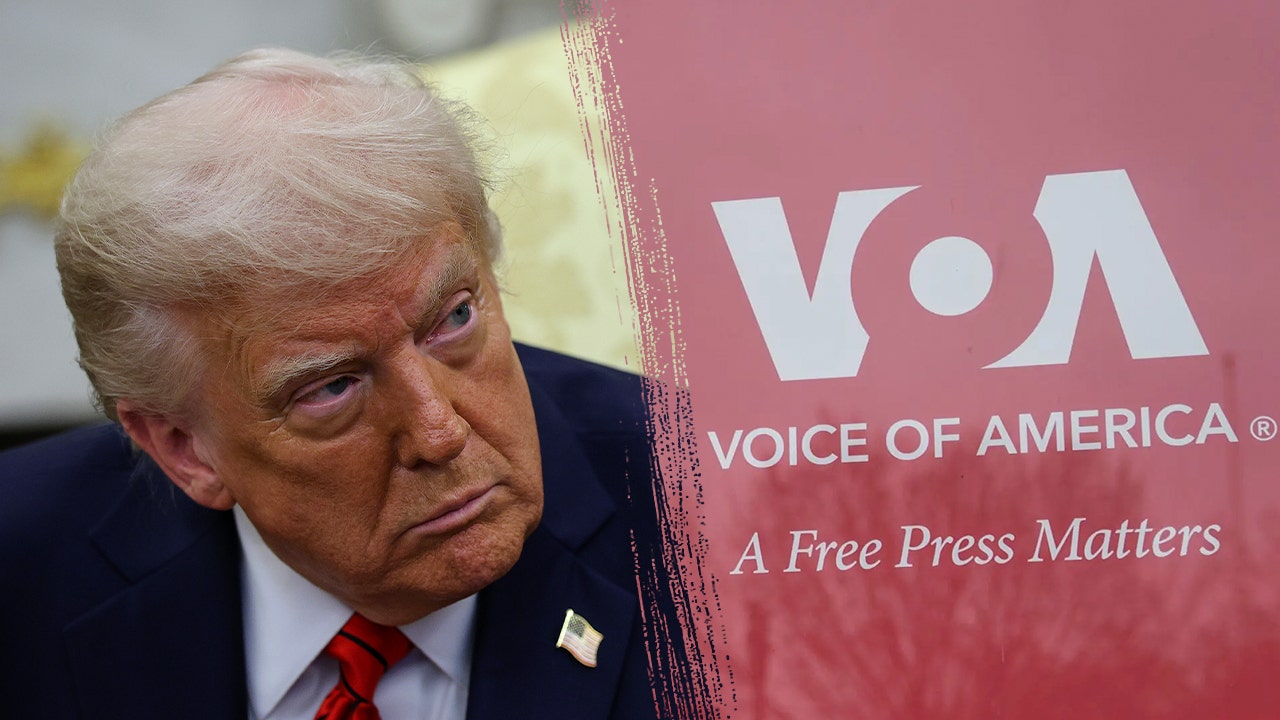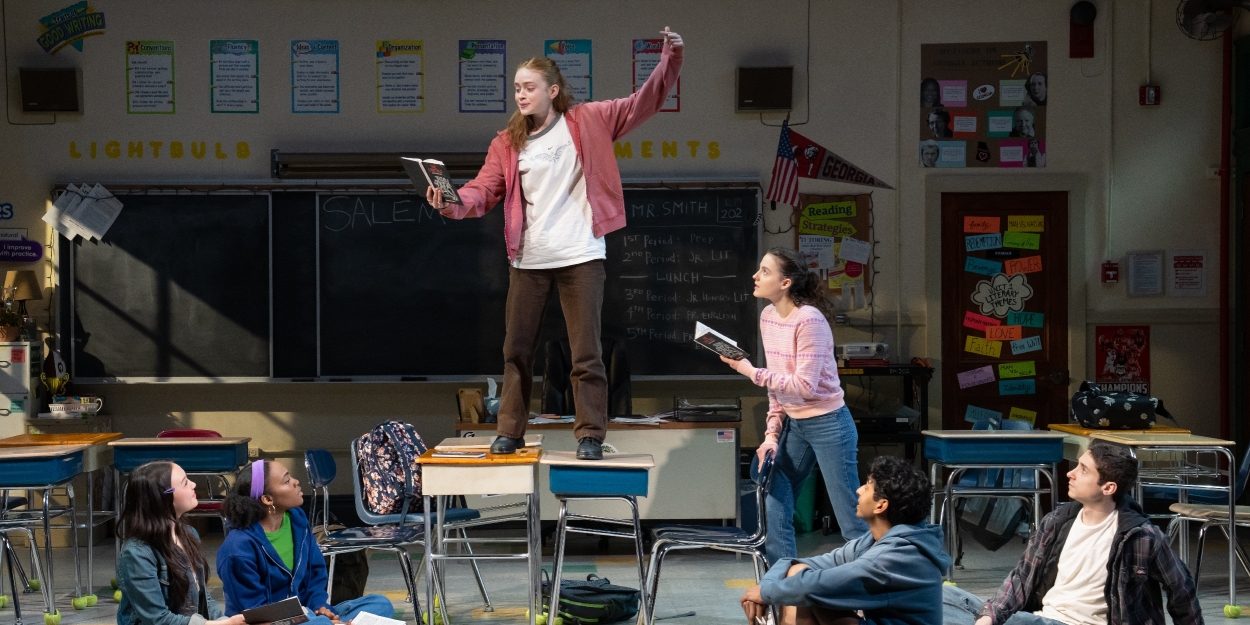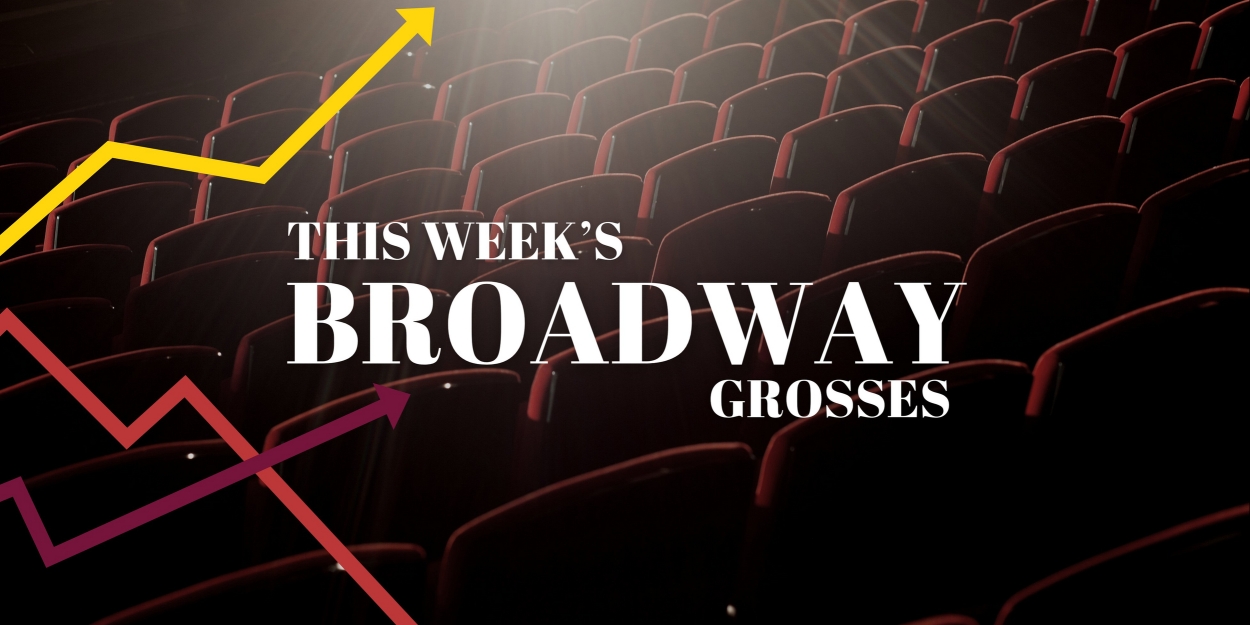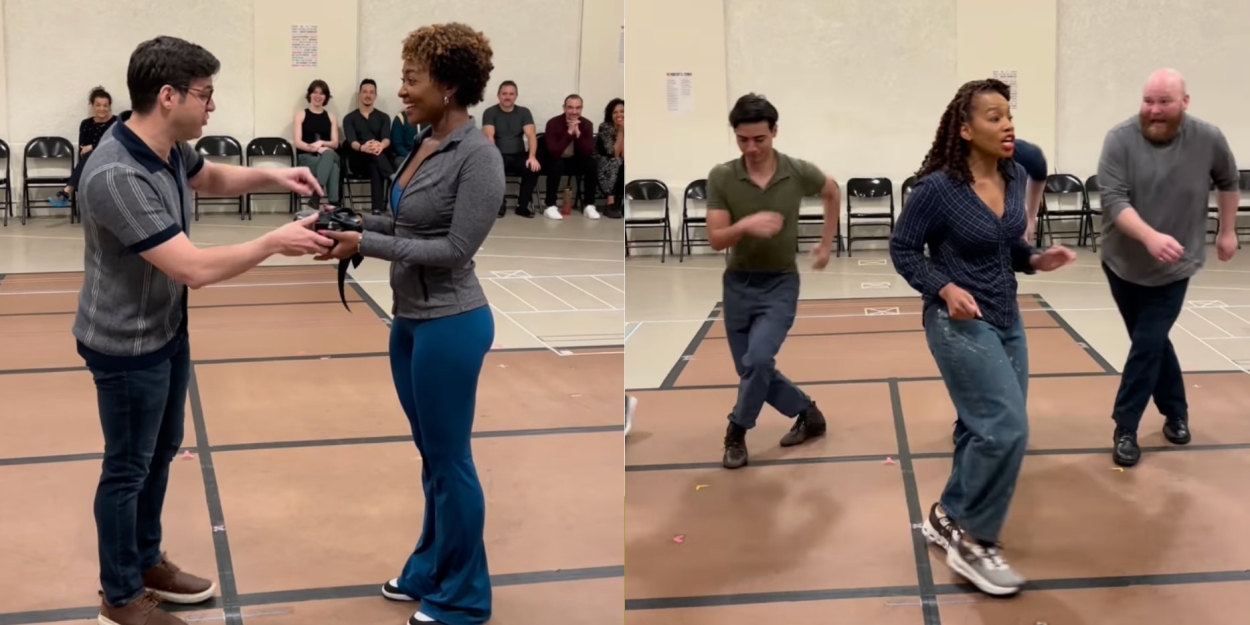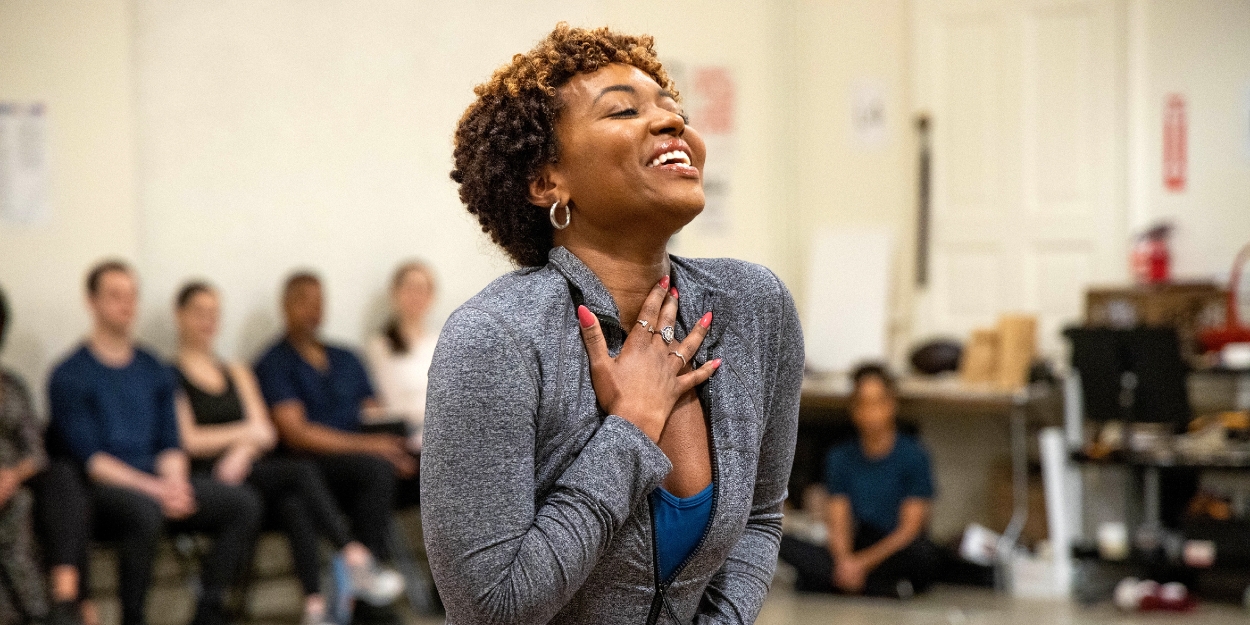The moral dilemma at the center of one of the greatest dramas of all-time comes to life on Broadway in John Proctor is the Villain, opening tonight! The new play stars Stranger Things breakout, Sadie Sink. Read the reviews!
She is joined by Nihar Duvvuri as ‘Mason Adams,’ Tony Award winner Gabriel Ebert as ‘Carter Smith,’ Molly Griggs as ‘Bailey Gallagher,’ Maggie Kuntz as ‘Ivy Watkins,’ Hagan Oliveras as ‘Lee Turner,’ Morgan Scott as ‘Nell Shaw,’ Fina Strazza as ‘Beth Powell,’ and Amalia Yoo as ‘Raelynn Nix.’ Understudies are Noah Pacht, Fiona Robberson, Shian Tomlinson, Garrett Young, and Victoria Vourkoutiotis.
In John Proctor is the Villain, five young women – fueled by pop music, optimism, and fury – clash with their school, their Georgia town, and the stories they’ve been instructed to believe. As their class dissects The Crucible, they begin to question who we deem heroic, who we call a villain, and who gets burned in the process.
Jesse Green, The New York Times: *CRITIC’S PICK* No matter. “John Proctor Is the Villain” is too urgently necessary about its one thing to make it worth wishing it were even a little different. That the urgency comes in an often hilarious, often ecstatic, highly accessible package is all the better. I hope a lot of high school girls — and boys — see it. Both need to understand that the case against John Proctor is just beginning.
Raven Snook, Time Out New York: John Proctor Is the Villain has had multiple regional productions since its 2022 premiere, but it’s hard to imagine a better mounting than its fast-paced and riveting Broadway incarnation, directed with clear-eyed compassion by Danya Taymor (who also directed The Outsiders, and knows her way around adolescent rebellion). Belflower has a supernatural gift for teenage vernacular and pop-culture touchstones, and the pitch-perfect cast makes you believe in these promising young women as they navigate puberty and the pitfalls of the patriarchy.
Christian Lewis, Variety: John Proctor Is the Villain” is the best play of the season, but even more significantly, it is a feminist masterpiece sure to become one of the defining works of art from and about the #MeToo era.
Greg Evans, Deadline: A play of uncommon nuance, shifting allegiances, and the wisest, most compassionate depiction of teens since the wonderful Kimberly Akimbo, John Proctor Is The Villain – first workshopped in 2018 – feels absolutely of the moment, as relevant today as Netflix’s brilliant Adolescence (though Proctor has no shortage of laughs).

Lovia Gyarkye, The Hollywood Reporter: And that’s true for all the girls in John Proctor Is the Villain, for at its core Belflower has constructed a poignant story of girlhood and empowering friendships. As Shelby adjusts to the new semester, she reconnects with her friends, especially Raelynn, and shares more information about the real reason why she left school. There are some moments that slacken here, especially as Belflower works her way to the twist, but with no intermission, the play’s frenzied pace continues uninterrupted and helps the inevitable revelation land with a real shock.
Jesse Hassenger, The Guardian: In the end, John Proctor Is the Villain doesn’t feel like a show designed to goose youth-audience ticket sales; it feels like one that will engage and electrify a teenage audience, and plenty of adults too.
Gillian Russo, New York Theatre Guide: In that regard John Proctor excels, all the way through to an electric final classroom scene that morphs into a surreal, cathartic outpouring of repressed emotion. It’s a play I would have loved — maybe needed — to see when I was the girls’ age… I was simply a teenage girl who didn’t yet know how to articulate everything in my overactive brain, especially amid a cacophony of teachers, preachers, parents, and friends firing off their own dogmas from all sides.
Matt Windman, amNY: The play doesn’t discard “The Crucible.” It wrestles with it—closely, critically, personally. The students point out how John Proctor remains emotionally distant and never fully acknowledges the harm he has caused to others. These aren’t acts of revisionism; they’re acts of engagement. And in that sense, “John Proctor is the Villain” becomes not just a critique of a text, but an embodiment of how literature should be read: actively, critically, and with full awareness of who gets to tell the story.
Juan A. Ramirez, Theatrely: John Proctor Is the Villain is much like [that moment]: a heady rush of glee, shock and understanding that takes you by surprise, and leaves you happy you came.
Sara Holdren, Vulture: Along with a dexterity for shaping character out of the casual contours of contemporary speech, Belflower also has a keen sense of balance: She hangs just enough of her play on The Crucible but not too much. This isn’t a riff or a rewrite. Miller’s text functions as a kind of flint — a surface on which Belflower’s characters, especially Shelby, can create sparks, but the fire that grows belongs to them. They are the living, wrestling souls, contending with more than any teenager should have to and just as much as many do.
Johnny Oleksinki, The New York Post: Belflower’s play says the opposite while mirroring Miller’s moral certitude about his own characters’ top-to-bottom guiltlessness. She casts zero doubt on the men being investigated. They absolutely did it.
David Cote, Observer: I cannot overpraise the talented cast and the snappy production, which moves like a bullet train and ends with a rebellious “Presentation Day” dance that sends shivers down your spine and tears down your cheeks. Sink and Yoo enter in white peasant dresses and enact a visionary feminist rewrite on The Crucible, then burn the house down with a war dance to, yes, “Green Light.”
Emlyn Travis, Entertainment Weekly: Combined, John Proctor Is the Villain not only serves as a modern day recontextualization of the original play, but also a laugh-out-loud funny and deeply affecting examination of girlhood, feminism, the #MeToo movement, and the unstoppable power of female friendship. It is pure, heartbreaking perfection.
Tim Teeman, The Daily Beast: Her mission to speak a new truth to old power doesn’t end there, and the play ends in a stunning mash-up of music (Lorde’s “Green Light”) and movement that unites the women on stage. It is a pulsating, fierce statement in Georgia in 2018 and also one across time and reality and fiction—a female-created dance of both defiance and an insistence upon true freedom.
Chris Jones, Chicago Tribune: I wish “John Proctor” made its very fair point about girls forging their own narratives with more ambivalence and less certitude, especially in its less-than-credible last few minutes, which you could subtitle “Abigail’s revenge,” or even that it gave Miller some consideration of how things have changed over time, not just from the witch trials to the 1950s but from then to now.
Brian Scott Lipton, Cititour: Just as people may not be who they originally seem, “John Proctor is the Villain” reveals more layers throughout its 100-minute running time as it hurtles to its conclusion. Even if some parts of the play fail to achieve its desired effect, there’s definitely an A for effort on everyone’s part.
Frank Scheck, New York Stage Review: The Playbill cover for John Proctor Is the Villain conveys it perfectly. It features several of the young characters in a circle while appearing to be screaming their heads off. That’s exactly how you’ll feel after enduring this well-meaning but exhausting play.
Melissa Rose Bernardo, New York Stage Review: John Proctor Is the Villain not only serves as a modern day recontextualization of the original play, but also a laugh-out-loud funny and deeply affecting examination of girlhood, feminism, the #MeToo movement, and the unstoppable power of female friendship. It is pure, heartbreaking perfection.
Jonathan Mandell, New York Theater: Central to the appeal of the production are the five actors who portray the female students. Their frank conversations about sex and celebrities, their shifting enmities and alliances, are funny but also feel spot-on. Their extended moments of laughing and crying and dancing together, even shrieking together, are infectious.

Average Rating:
83.0%
.




